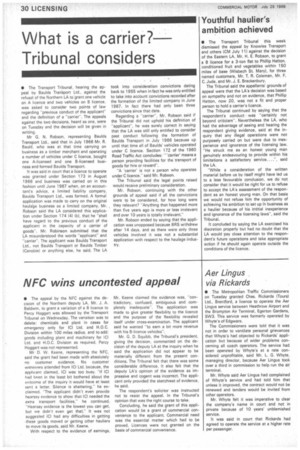NFC wins uncontested appeal
Page 32

If you've noticed an error in this article please click here to report it so we can fix it.
• The appeal by the NFC against the decision of the Northern deputy LA, Mr. J. A. Baldwin, to grant a variation of a B licence to Percy Hoggart was allowed by the Transport Tribunal on Wednesday. The variation was to delete: chemicals and plant in cases for emergency only for ICI Ltd. and H.O.C. Division within 100 miles radius, and to add: goods including plant and machinery for ICI Ltd. and H.O.C. Division as required. Percy Hoggart was not represented.
Mr D. W. Keene, representing the NFC, said the grant had been made with absolutely no customer evidence. No customer witnesses attended from ICI Ltd. because, the applicant claimed, ICI was too busy. "If ICI had been in the least bit bothered about the outcome of the inquiry it would have at least sent a letter. Silence is shattering," he exclaimed. "The applicant didn't even provide hearsay evidence to show that ICI needed the extra transport facilities," he continued. "Hearsay evidence is the lowest you can get, but we didn't even get that." It was not suggested ICI had any difficulties in getting these goods moved or getting other hauliers to move its goods, said Mr. Keene.
With respect to the evidence of earnings, Mr. Keene claimed the evidence was, "contradictory, confused, ambiguous and completely inadequate". The application was made to give greater flexibility to the licence and the purpose of the flexibility revealed itself under cross-examination. The applicant said he wanted "to earn a bit more revenue with his B-licence vehicles".
Mr. G. D. Squibb, the Tribunal's president, giving the decision, commented on the decision of the deputy LA at the inquiry when he said the application did not appear to be materially different from the present conditions. The Tribunal felt that there was some considerable difference. It also felt that the deputy LA's opinion of the evidence as impressive and cogent was incorrect. The applicant only provided the sketchiest of evidence, he said.
The respondent's solicitor was instructed not to resist the appeal. In the Tribunal's opinion that was the right course to take.
Concluding, he said the grant of this application would be a grant of commercial convenience to the applicant. Commercial need was the essential matter which had to be proved. Licences were not granted on the basis of commercial convenience.
















































































































